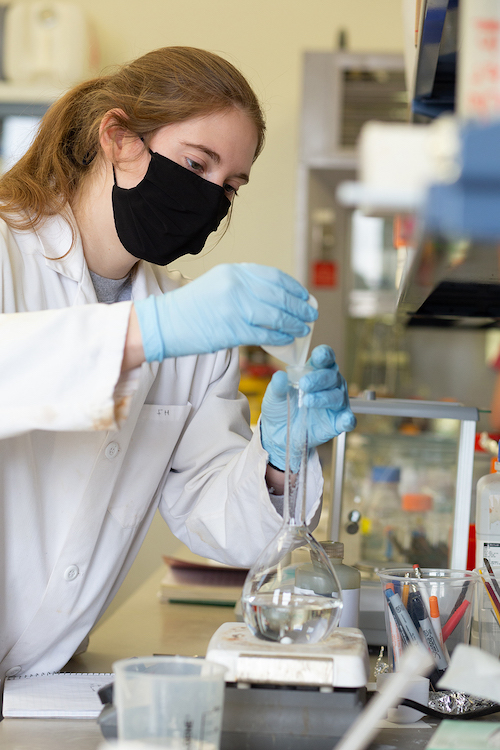
Written by Rachel Kraft Mattson
The cost of graduate school can be a roadblock for many students. With the average annual cost of tuition and fees coming in with a price tag of $19,000-29,000, figuring out a way to pay for this can be challenging for many students. To help curb the costs and promote a clearer route to graduate school, the Department of Bioproducts and Biosystems Engineering (BBE) developed an Integrated Degree Program (IDP), also known as the 4+1 program.
“It’s an accelerated graduate degree program that will save you time and money,” said Anna Warmka, a senior majoring in BBE, who is enrolled in the 4+1 program. “You can get your bachelor’s and master’s degrees in five years total, as opposed to the normal six for most programs. I think I was one of the first undergraduates to know about the program and apply!”
The program is a rigorous option for either BBE or Sustainable Systems Management (SSM) majors. It allows undergraduates to take graduate level credits at the lower undergraduate tuition rate. Up to 16 of the 30 credits for the Bioproducts and Biosystems Science, Engineering and Management (BBSEM) Master of Science program can be completed at the undergraduate tuition rate.
This program is geared towards “inquisitive, highly motivated students”, said Bruce Wilson, PhD, a professor in BBE who was chair of the Graduate Program Committee at the time the 4+1 program was being created. “BBE and SSM disciplines have more valuable information that can be covered in a 4 year program. A graduate degree provides greater training for our students, and often more professional opportunities after graduation.”
Applicants need to have a minimum GPA of 3.3 and a recommendation from a BBE or SSM faculty member or instructor. Wilson emphasized the importance of having research experience early on, as it strengthens the student’s application for the program. In addition to gaining experience from research, it also lends students the opportunity to get to know faculty members.
“Just because you want to go to graduate school and you have the grades, doesn’t mean you will be accepted,” said Wilson. “The department needs to identify someone who will advise you.”
Warmka became interested in research in air quality and air pollution early in her sophomore year. She reached out to faculty member Erin Cortus, PhD, and inquired about research opportunities she could assist with. “I emailed her and told her I was interested in research, and asked to set up a meeting. She said she had projects she could use help on and we started from there.”
This initial interaction provided Warmka with opportunities to get involved with Cortus’s air quality research projects. It also further solidified the path to graduate school, as she now had an invested faculty member who was open to advising her in the 4+1 program.
Cortus, who also had a role in the creation of the 4+1 program, said a big part of being a strong applicant is having an interest in research. “While not a prerequisite, I feel it is helpful if the student is already engaged in research by their junior year. Having some active research between junior and senior years helps ensure their thesis can also be finished in a timely manner.”
One of the most important parts of successfully navigating the program, is planning ahead. “It’s definitely a heavier course load,” said Warmka. “I knew I wanted to do this my junior year, so I devised my schedule accordingly so I would have room this year to add a couple graduate classes each semester. It’s still more credits than most seniors are taking, but it’s more manageable because I packed my junior year.”
On average, most full time undergraduate students take 15 credits, and a minimum of 13. This spring semester, Warmka is taking 18 credits. “But that does include snowboarding, which I don’t count as a real class, “ said Warmka through a chuckle, “so really, I’m taking 17 credits.”
Because the course load requires some planning, Cortus recommends students consult their undergraduate advisor for help . “The senior year course load is heavy, so revisiting the required courses in light of some extra classes will help make the transition easier.”
As for Ms. Warmka, she is still pondering her next step after she completes the 4+1 program. “I haven’t decided if I want to get my PhD., but I do want to continue doing research in some capacity.”
One thing she knows for sure, “whether I go into industry and do research, or continue on the academia route, I would like to stay in air quality research.”
If undergraduate students are interested in finding out more information about the 4+1 program, or applying, students should contact Roger Ruan, Director of our Graduate Program. Advisors also recommend students discuss the program with a faculty member they would like to work with during their graduate program.